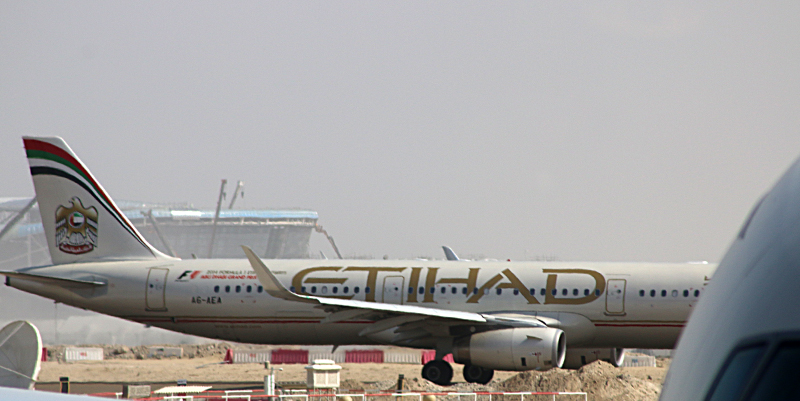The “aviation security enhancements” — which is known more popularly and appropriately as an electronics ban — became effective on Tuesday, March 21, 2017 with which all personal electronic devices larger than a mobile telephone were required to be placed and secured in checked baggage at ten airports from which flights depart for the United States, as they were no longer permitted in carry-on luggage or other accessible property in any passenger cabin aboard airplanes on the affected flights.
As first mentioned in this article pertaining to Royal Jordanian Airlines — from which the news of the electronics ban was first leaked — necessary medical devices would continue to be allowed to remain in the possession of the passenger after he or she has been screened.
Electronics Ban No Longer Applies to These Five Airlines — But…
Etihad Airways was the first airline which was permitted to be removed from the electronics ban; and one reason may be perhaps because Customs and Border Protection of the United States already has a facility at Terminal 3 in Abu Dhabi International Airport which allows passengers bound for the United States to process all immigration, customs and agriculture inspections in Abu Dhabi before departing so that they do not need to go through the customs and screening procedures once they arrive at their destinations.
Following the lead of Etihad Airways were Emirates Airline, Turkish Airlines and Qatar Airways — with Royal Jordanian Airlines being the latest airline to be exempt from the electronics ban — meaning that passengers may once again board airplanes with their portable electronic devices. The electronics ban was meant to remain in place through the middle of October; but the aforementioned five airlines have implemented new and improved security procedures at their base airports which meet the stricter criteria as required by the United States.
This means that five of the original ten airports which are still affected by the electronics ban — and two of those airports should be removed from the list once Saudi Arabia Airlines joins the aforementioned five airlines on Wednesday, July 19, 2017 in implementing new and improved security procedures — are as follows:
- Cairo International Airport — CAI
- King Abdul-Aziz International Airport — JED
- King Khalid International Airport — RUH
- Kuwait International Airport — KWI
- Mohammed V Airport — CMN
Great News?
There are reportedly legitimate reasons why the electronics ban became effective back in March — but there are also people who believe that the electronics ban was overkill.
In May of 2017, there was talk of the possibility of the electronics ban being expanded to include airports in Europe; and then shortly after, possibly applying it to all international flights to the United States — but there was reportedly resistance from governmental authorities in other countries in response to that potential directive.
Among some of the other relevant topics is the “greater risk of lithium battery fires if larger devices were kept in an aircraft’s hold” and that “the measure was introduced over fears a bomb could be concealed in a device.”
If this discussion posted on FlyerTalk is of any indication, there was also growing resistance from passengers as well — to the point where many of them were considering either cutting back on air travel or completing grounding themselves until the potential electronics ban was rescinded. When the news of affected airlines being exempt one by one from the current electronics ban started to spread, many people were relieved at the possibility that perhaps there will not be an expanded version of the electronics ban after all — although I have not found any reports that that is definitively the case…
…but was the possibility of the expansion of the electronics ban little more than puffery to have passengers relieved that all to which they may be subject is enhanced screening at airport checkpoints which they may have initially criticized? “If the idea of the banning electronics altogether test balloon was to make us more accepting of anything else they want to do, I have to say — it succeeded, at least with me”, posted FlyerTalk member whitearrow. “Any of the nonsense they’re planning is better than a ban or ridiculous and impractical limits. It still sucks, but at least not enough to make me cancel plans.”
Several FlyerTalk members openly posited that the latest developments are a way of the Department of Homeland Security — I still cannot stand that name — of the United States to “save face” from what was perceived as a failure and defeat to force other countries and airlines to follow its initial proposed directive. “I feel as though the latest proposals were a way to back down from the threat”, opined FlyerTalk member Fredrik74. “Notice the relative lack of details and that suddenly afterwards a couple of airports in the Gulf are good again.”
Summary
As it is already equipped with a facility which arguably incorporates similar equipment and policies to screening passengers at airport security checkpoints in the United States, I still have no idea why Abu Dhabi International Airport was affected by the electronics ban.
I personally do not exactly know what passengers will be required to endure as a result of the new and improved security procedures recently implemented by the aforementioned five airlines. Could longer lines at airport security checkpoints be forecast for the future? Will there be more scrutiny pertaining to closer inspections of portable electronic devices which consume more time?…
…and did the federal government of the United States just do what is known on FlyerTalk as a “giveback” where an airline takes away benefits to the detriment of members of its frequent flier loyalty program — only to placate them by “giving back” only one or two partial or whole benefits?
Photograph ©2015 by Brian Cohen.

